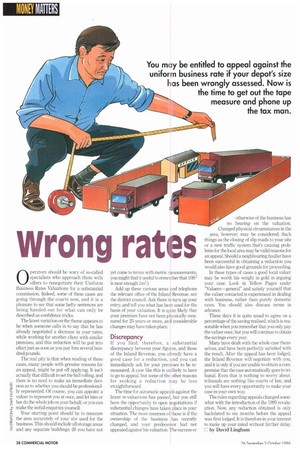Wrong rates
Page 40

If you've noticed an error in this article please click here to report it so we can fix it.
You may be entitled to appeal against the uniform business rate if your depot's size has been wrongly assessed. Now is the time to get out the tape measure and phone up the tax man.
0 perators should be wary of so-called specialists who approach them with offers to renegotiate their Uniform Business Rates Valuations for a substantial commission. Indeed, some of these cases are going through the courts now, and it is a pleasure to see that some hefty sentences are being handed out for what can only be described as confidence tricks.
The latest variation on the theme appears to be when someone calls in to say that he has already negotiated a decrease in your rates, while working for another client with similar premises, and this reduction will be put into effect just as soon as you pay him several hundred pounds.
The real pity is that when reading of these cases, many people with genuine reasons for an appeal, might be put off applying. It isn't actually that difficult to set the ball rolling, and there is no need to make an immediate decision as to whether you should be professionally represented. Of course, you can appoint a valuer to represent you at once, and let him or her do the whole job on your behalf, or you can make the initial enquiries yourself.
Your starting point should be to measure the area accurately of your site used for the business. This should include all storage areas and any separate buildings. (If you have not
yet come to terms with metric measurements, you might find it useful to remember that 10ft2 is near enough 1m2.)
Add up these various areas and telephone the relevant office of the Inland Revenue, not the district council. Ask them to turn up your entry, and tell you what has been used for the basis of your valuation. It is quite likely that your premises have not been physically measured for 25 years or more, and considerable changes may have taken place,
Discrepancy
If you find, therefore, a substantial discrepancy between your figures, and those of the inland Revenue, you already have a good case for a reduction, and you can immediately ask for your premises to be remeasured. A case like this is unlikely to have to go to appeal, but some of the other reasons for seeking a reduction may be less straightforward..
The time for automatic appeals against the latest re-valuations has passed, but you still have the opportunity to open negotiations if substantial changes have taken place in your situation. The most common of these is if the ownership of the business has recently changed, and your predecessor had not appealed against his valuation. The success or
otherwise of the business has no bearing on the valuation.
Changed physical circumstances in the area, however, may be considered. Such things as the closing of slip roads to your site or a new traffic system that's causing problems for the local area may be valid reasons for an appeal. Should a neighbouring haulier have been successful in obtaining a reduction you would also have good grounds for proceeding.
In these types of cases a good local valuer may be worth his weight in gold in arguing your case. Look in Yellow Pages under "Valuers—general" and satisfy yourself that the valuer contacted is experienced in dealing with business, rather than purely domestic rates. You should also discuss terms in advance.
These days it is quite usual to agree on a percentage of the saving realised, which is reasonable when you remember that you only pay the valuer once, but you will continue to obtain the savings every year.
Many have dealt with the whole case themselves, and have been perfectly satisfied with the result. After the appeal has been lodged, the Inland Revenue will negotiate with you, and it is only if you are unable to obtain a compromise that the case automatically goes to tribunal. Even that is nothing to worry about. tribunals are nothing like courts of law, and you will have every opportunity to make your case in your own way.
The rules regarding appeals changed somewhat with the introduction of the 1995 revaluation. Now, any reduction obtained is only backdated to six months before the appeal was first lodged. It is therefore in your interest to make up your mind without further delay. E by David Lingham








































































































































